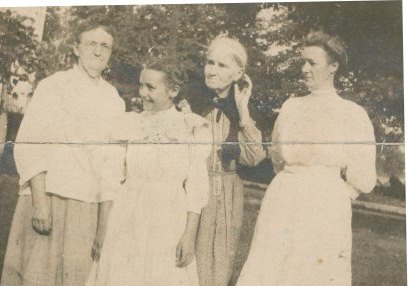By Susan Martin, Collection Services
Unfortunately we’ve come to our last installment on the letters of Moses Hill here at the MHS. After the devastating fighting around Richmond that I described in my previous post, Robert E. Lee drove the Union army south to Berkeley Plantation on the shores of the James River. This estate served as George B. McClellan’s headquarters in July and August 1862, and here Moses and the other Andrew Sharpshooters got a short respite, a chance to regroup while the Union forces were replenished with new recruits.
Over the last two weeks, Moses had fought in multiple battles, including Savage’s Station on June 29, Glendale on June 30, and Malvern Hill on July 1. He wrote to his wife Eliza about the grueling retreat:
I think there must of been a great meny sick & wonded left behind. After I gave out I saw hundreds of wonded & sick limping and working themselvs along the best way they could. It was a horable sight to see them exert every nurve and strife for life. I am glad you did not see them. Horses would run over them and nock them down. They had to creep crall any way to get along.
Union morale was low after the failure to take Richmond, but Moses still hoped to be back home in Medway, Mass. soon. He treasured a photograph Eliza had sent him:
I received your Picture and I think it looks very naturel or as you looked when I left home. I think I shold remember how you all looked if I was off for a long while. I like to take your picture out and look at it. I think of you a great deal and the children too.
However, Moses had been complaining more frequently of illness, and he finally confessed to his wife, “I have been quite unwell long back.” He suffered from diarrhea and fatigue, weighed only 126 pounds, and was sometimes too weak to walk even a half-mile. His clothes were in tatters, and he was plagued by the heat and the flies. His mother, Persis Hill, described one of his letters as “the most disenharted letter he ever has rote. It seames he is all down and discouraged.”
On 16 Aug. 1862, the Union troops decamped from Berkeley Plantation and moved downriver to Newport News. Moses wrote to his family from there a week later. But while he had been a regular correspondent during his year of military service, they wouldn’t hear from him again for almost a month. On September 18, he wrote from Harewood Hospital in Washington, D.C.:
It is a very pleasant place but it is not home….Eliza I should of writen before but I have been so unwell that I did [not] feel as I could. I think I have wored about you as much as you have about me, for I knew that you did not know what had be[c]ome of me. I am run down and I want a good nursing. I ought to be at home. Some days I am better and then I am worse, but If I take good care of myself I think I shall get a little stronger….Dear Eliza do not worry about me for I shal try to getalong. I will write again soon. You must excuse me for I am very tired. My love to all and lots of kisses.
This is the last letter in the collection written by Moses Hill.
His family received his letter “with the greatest pleasure imaginable.” Eliza was relieved he had been spared from the battle at Antietam, where his regiment suffered terrible losses. (She added guiltily, “I know it is selfish to say so, but I cannot help it.”) She and their teenaged daughter Lucina wrote to Moses several times at the hospital, but did not receive any replies. Their letters became more and more frantic. On October 5, Eliza wrote:
I feel very anxious about you. If you are not able to write yourself, do get some one to write for you. Mother Hill and your sisters are as worried as I am. We want to know just how you are, what ails you. I want to have you come home for me to take care off, if it is possible….I think of you, and pray for you, daily, and hourly….I want to see [you] so much. I send you my best love, and wishes, with many kisses.
Lucina added a postscript about her three-year-old brother: “Georgie askes for father about every day.”
With the help of George Lovell Richardson of East Medway, Moses Hill was discharged from service on 13 Oct. 1862. Richardson accompanied him home, and they reached Medway on the 17th. Moses died of consumption 12 days later. He is buried at Prospect Hill Cemetery in Millis, Mass.
Eliza Hill died in 1888.
 Left to right: Lucina (Hill) Howe, Helen Richardson, Eliza Hill, and Genieve Richardson
Left to right: Lucina (Hill) Howe, Helen Richardson, Eliza Hill, and Genieve Richardson
Undated photograph, circa 1885. Frank Irving Howe, Jr. Family Papers.


 Left to right: Lucina (Hill) Howe, Helen Richardson, Eliza Hill, and Genieve Richardson
Left to right: Lucina (Hill) Howe, Helen Richardson, Eliza Hill, and Genieve Richardson